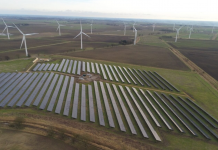Britain’s steel, glass and other intensive energy purchasers are seeking urgent relief measures from the Johnson government, as wholesale markets surge to record prices for gas.
With gas trading yesterday, briefly at an unprecedented 355 pence per therm for day-ahead delivery, a 37% rise on the day, the Energy Intensive Users Group warned of shutdowns in essential industries if the government or Ofgem did not intervene.
Chemicals, steel and fertiliser production were all at risk, said the trade group. Fertiliser output at Britain’s two major plants, Ince in Cheshire and Billingham on Teesside, was suspended last week. Carbon dioxide, a fertiliser by-product, and critical in applications from stunning animals sent for slaughter, to preserving food and priming pumps, has suffered in consequence.
EIUG chairman Richard Leese said:,“We have already seen the impact of the truly astronomical increases in energy costs on production in the fertiliser and steel sectors.
“Nobody wants to see a repeat in other industries this winter given that UK energy-intensive industries produce so many essential domestic and industrial products and are intrinsically linked with many supply chains.”
Natural gas’s previous record in London trading had been 120 pence per them, reached in 2018 as the ‘Beast from the East’ battered the British Isles.
UK government bonds – supposedly low-risk ‘gilts’ – saw heavy selling today, unnerving London’s capital markets. All FTSE share indices dropped at least 1.0% yesterday morning; the FTSE 100 was off 1.7% before rallying to 1.19% lower at 2pm.
Brent crude oil remained above $80 per barrel on London markets yesterday, peaking close to $83, before falling back to $ 81.4 by the end of the day.
In Europe, a 60% rise over just two days in gas prices prompted the EU Commission to issue a warning. On Thursday, Yahoo reported France’s prime minister Jean Castex telling TF1 viewers the Macron government will freeze natural gas and electricity retail prices, despite an anticipated further 30% in gas price hikes before the spring.
Giving the lie to Premier Johnson’s alliterative boosterism today in his conference speech in Manchester, this week the British Chambers of Commerce published its latest members’ survey.
The BBC’s 5,700 respondents said fears of rocketing energy and labour prices were prompting 47% overall were likely to raise prices by January.
Reuters this week reported Russian President Vladimir Putin as opining that “hysteria” in markets was caused by a muddled approach to Net Zero adopted by the West.
“Some people are speculating on climate change issues, some people are underestimating some things, some are starting to cut back on investments in the extractive industries. There needs to be a smooth transition”, the premier reportedly said.




The typical payback period for on-site energy generation on a commercial building using solar PV was around 6-7 years at the beginning of this year. It is now around 4-5 years.
Price pressure on energy is still upwards for the long-term meaning payback periods will continue to decrease.
Businesses have focussed too long on flexible contracts and so-called risk management. But at best these simply minimise or delay the continuing increase in energy costs.
To remain competitive and really take control of their energy costs businesses need to maximise their on-site generation.
In short, a roof without solar is a wasted roof.